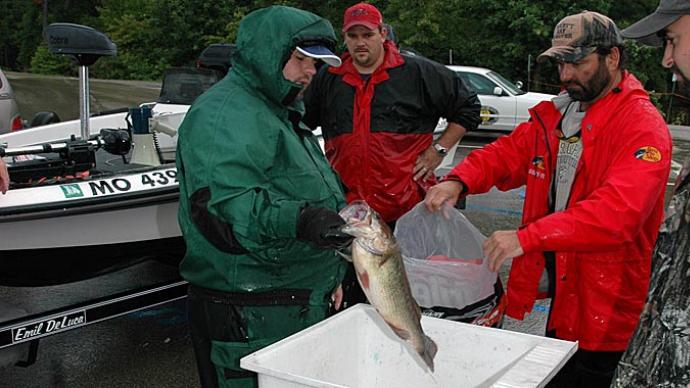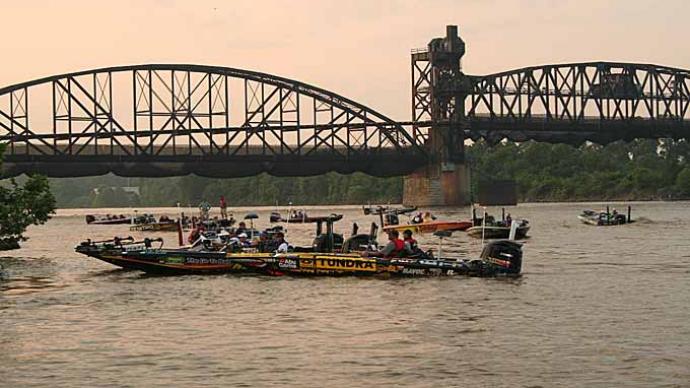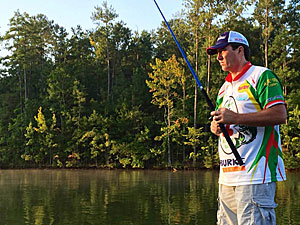
Eddie Johns is a retired high school teacher who has fished local and benefit tournaments for over 30 years. In that time, he has participated in over 600 tournaments and won 208 of them. How would you like to win one out of every three tournaments you fish? He has 278 top ten finishes, and he’s been in the money 75% of the time. Pretty good stats, right? His fishing prowess has landed him sponsors such as propatterns.com, Creme Lures, and R&S Rods.
What’s his secret to success? Long ago, when bass pros mingled with us common folk during and after weigh-ins, Eddie approached Hank Parker and asked him the big question: “What is something you can tell me to help my fishing that would help everybody?” Hank’s reply was, “Keep a log.” Eddie took the advice to heart and immediately began to take notes every time he went fishing. Hank had said to write it all down and not let anybody look at it, and that’s what Eddie has done. He’s had major bucks offered for the book, but no amount of money could persuade him to part with it. He doesn’t even tell his partners what’s in the book. It’s been the effort of nearly 30 years of fishing and taking notes. He jokes that he has told his wife and kids that if a fire breaks out, they need to find their way out – he’s going for the book!
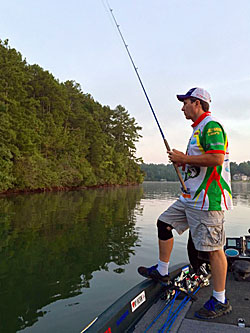
What the book has taught him about fishing is fantastic. For instance, he recently went fishing after a hurricane blew through his area. He looked in his book, and in 1988, after a hurricane at that same time of year, he wrote down where and how he had caught fish. Guess what? The fish were in the same place eating the same thing in 2015 as in 1988. “Just look for the same conditions, or as close to them as you can get, and the fish will still be there.” You may have to alter things just a bit, but for the central part, Eddie says they keep doing the same things in the same conditions year after year.
Eddie’s book is organized by months, so if he goes fishing in September, he looks in the book for that month and examines all the notes he’s taken for the particular lake he’s headed to. As the years have gone by, he has added to what he includes in his notes. He brings a small notebook with him every time he goes fishing, and he jots things down quickly – things that will jog his memory once he sits down to add them to the book. Often, it is a sketch of where he is on the lake, with arrows showing wind direction, notes on air and water temperatures, and where and how he caught fish. He jots down abbreviations that tell him about stumps, grass, rocks, etc. Also, he says it’s essential to write down what doesn’t work – it saves you a lot of time next time. He can jot down quite a bit of information as he’s idling; it takes seconds.
At first, he just wrote the dates and some basic stuff, but now he’s much more specific. He includes what the weather has been like for the past 2-3 days, the times of day he caught fish, the phase of the moon, water and air temperatures with any changes, and colors the fish were biting. Being an engineer (he taught CAD in high school), he notices patterns that can be hard to believe. For instance, over time, he noticed that what color worked best could correlate to the moon's phase. So he designed his little wheel – he can spin it to the phase of the moon, and it gives him what colors to start with. Sponsors are always asking him what his favorite color is, he says, and they are amazed when he tells them he doesn’t have one. Eddie’s favorite color is whatever the fish are biting.
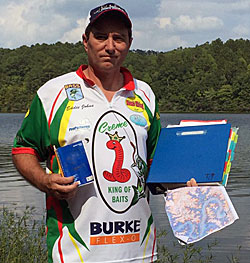
It’s incredible how much information you can get just by making a few notes. He wishes he had written down notes every time he went out, but he hasn’t. It’s probably a good thing for the competition that he didn’t.
When the water in a lake is down for any reason, he takes photos and notes on the back so he knows where they were taken, and he puts them in the book. “Hank Parker told me never to rely on my memory. He asked me where I was fishing one year ago and how and where I caught the fish, and I couldn’t tell him.”
Another thing Eddie does that may be surprising because he keeps his book on paper. “Computers can crash or get hacked or stolen, and phones can fall in the lake,” he explains, “so I keep my book on paper, and I keep it safe at home.” The small notebook with that day’s notes is all he ever risks losing.
Keeping a log is a chore, and Eddie admits that sometimes you have to force yourself to do it – it takes time. As for dock talk, Eddie rarely writes down what anyone else says about their fishing that day. He might make a note if someone good stops at a specific place first thing, but that’s about it. Another thing the book does is it keeps him more observant. He knows he will write things down, so he pays much more attention to the environment. That has helped him be a better fisherman.
Eddie told me, “Everyone wants to see my book. 100% of fishermen wish they had one, but only about 1% will do it”. He’s heard it a thousand times – “I wish I’d started doing that when I was young like you!” However, never once has he heard a guy who keeps a log say it was a waste of time. He says that having all that information at your fingertips also gives you tons of confidence, and confidence is a good thing, especially for a bass fisherman.
********************************************************************
It’s never too late to start keeping a log. Here's a free fishing log for your use. Just print it off and fill it out every time you go fishing. Grab a small notebook and jot down some info next time you’re on the lake. Do it while you’re there – don’t rely on memory.
If you don't want to use the pre-made fishing log, then here are some suggestions for things you might want to make a note of:
Date
Lake
Tournament (include your finish)
Launch time and spot
Moon phase
Air temperature
Water temperature (and note any changes in these temps during the day)
Wind direction and speed (include changes and times)
Who you fished with
Weight of fish caught (estimate)
Where each fish was caught (depth, structure, cover, etc.)
Sunrise
What you caught them on
How deep the fish were
Draw a little map and make marks to show grass, stumps, rocks, etc.
Which direction his boat was going at the time (an arrow works great)
What color they were biting
Details on rigs such as sinker weight, hook size, leader length, etc
Details about structure and cover – were the rocks around or jagged? Grass emergent or submerged?
What didn’t work – this is very important.
Take notes in pencil. Pen can wash away if it gets wet. You can now buy waterproof notebooks if you want to, but still – use a pencil.
Again, you don’t have to neglect your fishing to write down every move you make. Jot down marks on a sketch while you idle outside the no wake zone. You’ll write it in detail in the actual log when you get home. These notes are to jog your memory. But don’t wait too long to add them to your log, or you’ll forget key points. If you’re serious about being a better fisherman, don’t moan about not doing it sooner – do it now!


